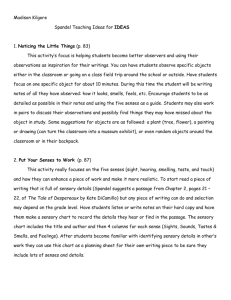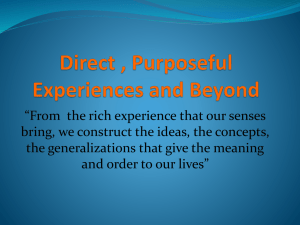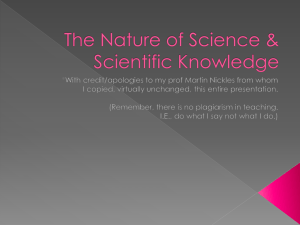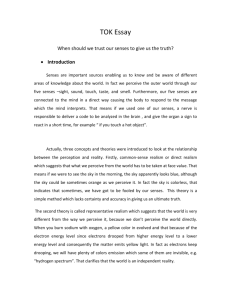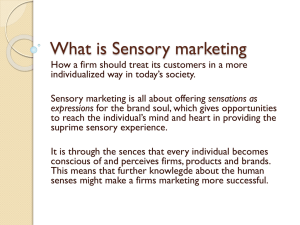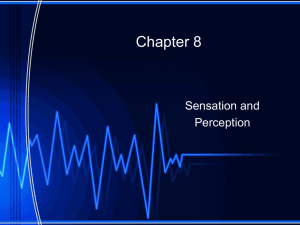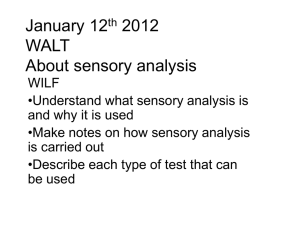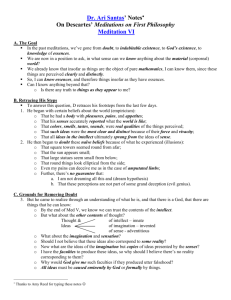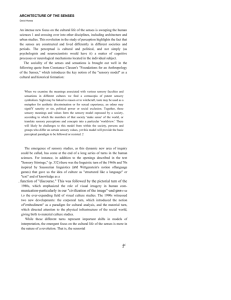Texts for Reconstructing Meditations 6
advertisement
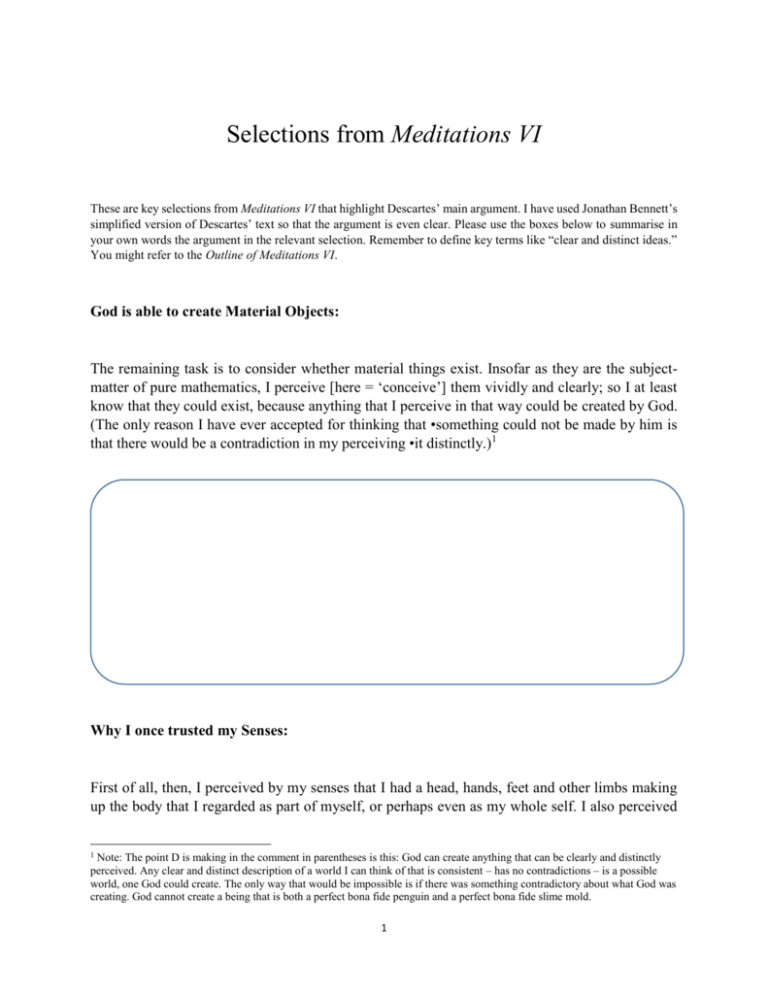
Selections from Meditations VI These are key selections from Meditations VI that highlight Descartes’ main argument. I have used Jonathan Bennett’s simplified version of Descartes’ text so that the argument is even clear. Please use the boxes below to summarise in your own words the argument in the relevant selection. Remember to define key terms like “clear and distinct ideas.” You might refer to the Outline of Meditations VI. God is able to create Material Objects: The remaining task is to consider whether material things exist. Insofar as they are the subjectmatter of pure mathematics, I perceive [here = ‘conceive’] them vividly and clearly; so I at least know that they could exist, because anything that I perceive in that way could be created by God. (The only reason I have ever accepted for thinking that •something could not be made by him is that there would be a contradiction in my perceiving •it distinctly.)1 Why I once trusted my Senses: First of all, then, I perceived by my senses that I had a head, hands, feet and other limbs making up the body that I regarded as part of myself, or perhaps even as my whole self. I also perceived 1 Note: The point D is making in the comment in parentheses is this: God can create anything that can be clearly and distinctly perceived. Any clear and distinct description of a world I can think of that is consistent – has no contradictions – is a possible world, one God could create. The only way that would be impossible is if there was something contradictory about what God was creating. God cannot create a being that is both a perfect bona fide penguin and a perfect bona fide slime mold. 1 by my senses that this body was situated among many other bodies that could harm or help it; and I detected the favourable effects by a sensation of pleasure and the unfavourable ones by pain…. All I was immediately aware of in each case were my ideas, but it was reasonable for me to think that what I was perceiving through the senses were external bodies that caused the ideas. For I found that these ideas came to me quite without my consent: I couldn’t have that kind of idea of any object, even if I wanted to, if the object was not present to my sense organs; and I couldn’t avoid having the idea when the object was present. Also, since the ideas that came through the senses were much more lively and vivid and sharp than •ones that I formed voluntarily when thinking about things, and than •ones that I found impressed on my memory, it seemed impossible that sensory ideas were coming from within me; so I had to conclude that they came from external things. Why I learned to doubt my Senses: Later on, however, my experiences gradually under- mined all my faith in the senses. A tower that had looked round from a distance appeared square from close up; an enormous statue standing on a high column didn’t look large from the ground. In countless such cases I found that the judgments of the external senses were mistaken, and the same was true of the internal senses. What can be more internal than pain? Yet I heard that an amputee might occasionally seem to feel pain in the missing limb. So even in my own case, I had to conclude, it was not quite certain that a particular limb was hurting, even if I felt pain in it. To these reasons for doubting, I recently added two very general ones. •The first was that every sensory experience I ever thought I was having while awake I can also think of myself as having while asleep; and since I don’t believe that what I seem to perceive in sleep comes from things outside me, I didn’t see why I should be any more inclined to believe this of what I think I perceive while awake. •The second reason for doubt was that for all I knew to the contrary I might be so constituted that I am liable to error even in matters that seem to me most true. (I couldn’t rule this out, because I did not know—or at least was pretending not to know—who made me.) And it was easy to refute the reasons for my earlier confidence about the truth of what I perceived by the senses. Since I seemed to be naturally drawn towards many 2 things that reason told me to avoid, I reckoned that I should not place much confidence in what I was taught by nature. My Mind is distinct from my Body (and so my Intellect is distinct from Sense Perception): I know that if I have a vivid and clear thought of something, God could have created it in a way that exactly corresponds to my thought. So the fact that I can vividly and clearly think of one thing apart from another assures me that the two things are distinct from one another—•that is, that they are two•—since they can be separated by God. Never mind how they could be separated; that does not affect the judgment that they are distinct. •So my mind is a distinct thing from my body. Furthermore, my mind is me, for the following reason•. I know that I exist and that nothing else belongs to my nature or essence except that I am a thinking thing; from this it follows that my essence consists solely in my being a thinking thing, even though there may be a body that is very closely joined to me. I have a vivid and clear idea of •myself as something that thinks and isn’t extended, and one of •body as something that is extended and does not think. So it is certain that •I am really distinct from •my body and can exist without it. 3 I can have intellectual knowledge of material objects: Now, I have a passive faculty of sensory perception, that is, an ability to receive and recognize ideas of perceptible objects; but I would have no use for this unless something—myself or something else—had an active faculty for producing those ideas in the first place. But this faculty can’t be in me, since clearly it does not presuppose any thought on my part, and sensory ideas are produced without my cooperation and often even against my will. So sensory ideas must be produced by some substance other than me—a substance that actually has (either in a straightforward way or in a higher form) all the reality that is represented in the ideas that it produces. Either (a) this substance is a body, in which case it will•straightforwardly contain everything that is represented in the ideas; or else (b) it is God, or some creature more noble than a body, in which case it will contain •in a higher form whatever is to be found in the ideas. I can •reject (b), and• be confident that God does not transmit sensory ideas to me either directly from himself or through some creature that does not straightforwardly contain what is represented in the ideas. God has given me no way of recognizing any such ‘higher form’ source for these ideas; on the contrary, he has strongly inclined me to believe that bodies produce them. So if the ideas were transmitted from a source other than corporeal things, God would be a deceiver; and he is not. So bodies exist. They may not all correspond exactly with my sensory intake of them, for much of what comes in through the senses is obscure and confused. But at least bodies have all the properties that I vividly and clearly understand, that is, all that fall within the province of pure mathematics. 4 When can I trust sense perception? …for knowledge of the truth about such things [material objects] seems to belong to the mind alone, not to the combination of mind and body. So, although a star has no more effect on my eye than a candle’s flame, my thinking of the star as no bigger than the flame does not come from any positive •‘natural’• inclination to believe this; it’s just a habit of thought that I have had ever since childhood, with no rational basis for it. Similarly, although I feel heat when I approach a fire and feel pain when I go too near, there is no good reason to think that something in the fire resembles the heat, or resembles the pain. There is merely reason to suppose that something or other in the fire causes feelings of heat or pain in us. Again, even when a region contains nothing that stimulates my senses, it does not follow that it contains no bodies. I now realize that in these cases and many others I have been in the habit of misusing the order of nature. The right way to use the sensory perceptions that nature gives me is as a guide to what is beneficial or harmful for my mindbody complex; and they are vivid and clear enough for that. But it is a misuse of them to treat them as reliable guides to the essential nature of the bodies located outside me, for on that topic they give only very obscure and confused information. 5 6

